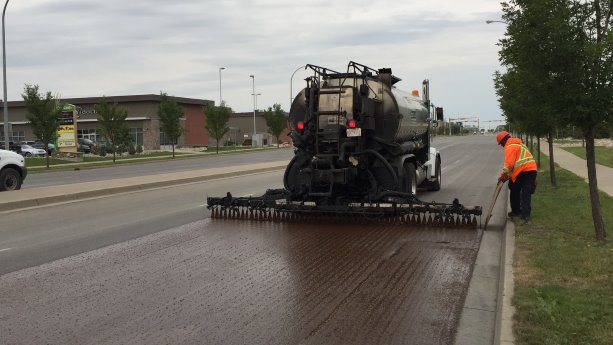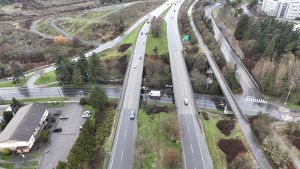The City of Regina is trying out a new method to increase the life of its aging roads.
Norman Kyle, Regina’s director of roadways and transportation, explained the new treatment seals the pavement, preventing moisture from penetrating into it, which causes cracks and erosion.
He discovered the product and technique had been used with success in similar climates to Regina.
Crews start by sweeping the road. They then spray the sealant, allowing it to penetrate the cracks in the pavement. Sand is spread on top of the sealant. A roller attached to a truck pushes the sand and sealant deep into the pavement and the excess is removed with a street sweeper.
Crews will do the treatment at about 20 sites over around 260,000 square metres of pavement. The results will be evaluated over the next year to determine how the sealant stands up to the Regina climate.
The pilot project will cost $350,000, which Kyle said is around 10 per cent of the price of traditional road repairs. If successful, it could be expanded to more roads.
Kyle explained over time pavements oxidize and become more brittle which inevitably leads to cracks. Crews typically would do a slurry seal or micro surfacing to seal it.
"There was a lack of investment in infrastructure for a few years," said Kyle. "This has the potential to extend the lifecycle of a road by at least five years. If we can do that, it’s a good thing."
He noted the process can be repeated, meaning a road’s life could be extended by 10 years or more.
However, the roads have to be free of ruts, potholes and wide cracks as well as structurally sound.
Generally this means the roads can’t be older than seven to 10 years. Also, the temperature has to be between 15 and 30 C with no rain or strong winds.
"It’s about applying the right treatment at the right time," Kyle said.
He added the technique is environmentally-friendly and less invasive. This is a boon for drivers and businesses as the process only takes about four hours.
"The total cost to apply these treatments is estimated at one tenth that of repaving a roadway. Should the pilot program be successful, lifecycle maintenance costs for treated roadways could be reduced by as much as 60 per cent," said Mayor Michael Fougere in a press release. "If this treatment is successful, this would allow us to allocate more resources to roads that have greater and higher cost needs like repaving or reconstruction."











Recent Comments
comments for this post are closed